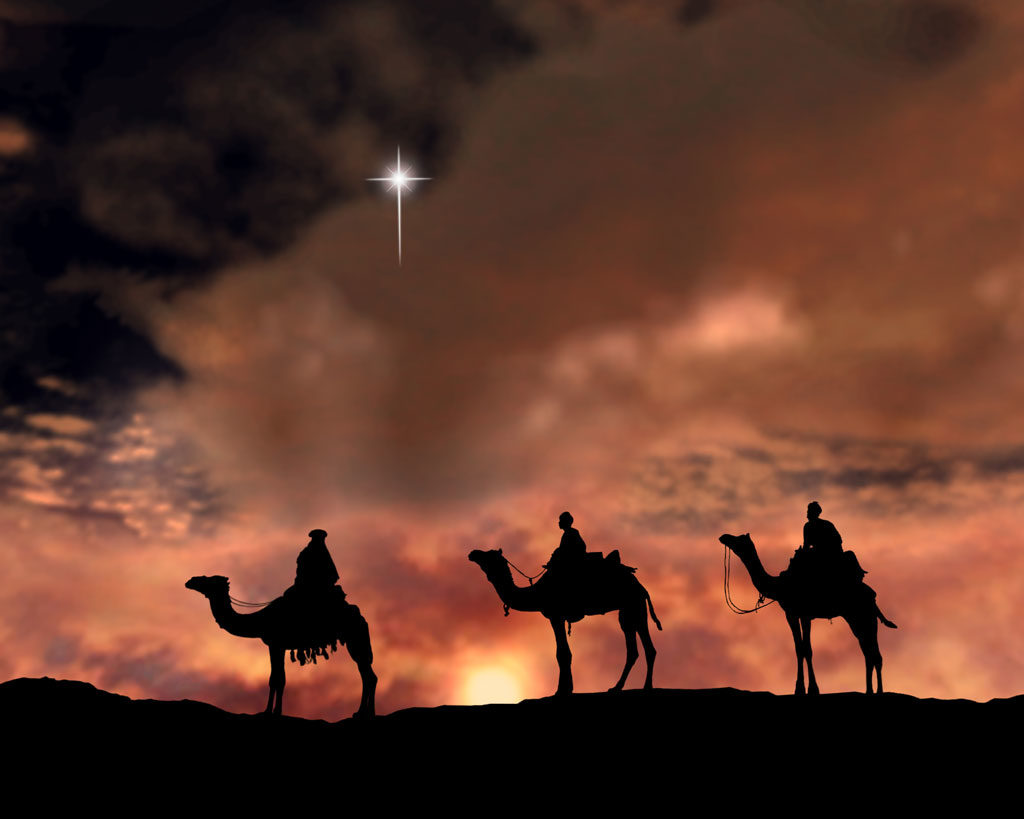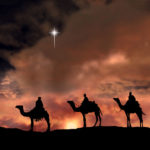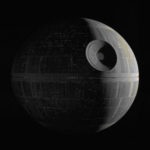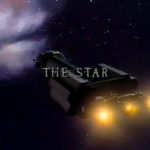Speculative Christmas, Part 5: A New Star
Hold it…Christmas is over, right?
Not so fast, pilgrim. The Christmas story still has one more episode yet to unfold: the visit of the wise men, the Magi, celebrated in the feast of Epiphany, on or about January 6.
There’s a lot of folklore that’s grown up around the Magi. We don’t know precisely where they came from, their names, or how many there were, though the carols and stories around the hearth leave the impression that we do. Some writers have connected them with Daniel’s legacy in ancient Persia. They were stargazers, probably astrologers rather than astronomers, though magic and science tended to overlap quite a bit in those days. They most likely weren’t present at the manger and may have arrived in Bethlehem up to two years later.
Mostly, they’re a puzzlement. They were pagans, and Gentiles, yet they sought the King of the Jews and undertook a long, hazardous journey to find him. They were the only ones who recognized Jesus as civil royalty, lavishing him with rich gifts at his coming. God provided a sign in the heavens appropriate for them to correctly interpret and follow, though the Scriptures condemn the practice of astrology. Why them? What need was there for Jesus to be celebrated as a legitimate ruler on Earth, by them? I don’t know. Gallons of ink and reams of paper have been expended in attempts to comprehend the enigma of the Magi, and I can’t add to this storehouse of scholarship in a few lines on a blog, even if I wanted to. Frankly, I love a good mystery, and I’m content in this situation to accept the answer, “just because.”
The Star of Bethlehem also generates a lot of speculative energy this time of year, and there’s always the requisite news interview with an astronomer who racks and stacks the various plausible scientific explanations for a phenomenon Christians are perfectly willing to accept as miraculous. This article favors a planetary conjunction of Venus and Jupiter, though comets and supernovae are also considered. If you’ve been watching the conjunction of the Moon and Venus the past couple of nights, you have an idea of how impressive the near approach of two bright celestial bodies can be. In the final analysis, the why and how, again, aren’t so important. Something remarkable happened, and it brought the Magi to the place and time they needed to be.
When people start chatting about the Christmas Star, I always think about Arthur C. Clarke’s classic short story, “The Star,” in which a crew of space archaeologists finds an archive of artifacts from an extinct alien civilization, with a disturbing connection to the Nativity story. The protagonist, a Jesuit scientist, assembles the evidence into a result that leaves his faith, like a Bond martini, shaken, not stirred.
The outcome isn’t especially surprising. Clarke was an atheist, though he admitted a lifelong fascination with the idea of God, and he trips over the standard paradox that is a deal-breaker for most atheists—bad things happen to good people. Clarke was a talented writer with considerable foresight, one of our modern Magi, if you will, wandering through the wilderness in search of he knew not what, but unwilling to follow the Star shining brilliantly in the night sky nor to believe it could possibly point to the truth.
May we have eyes to see the Star that still illuminates our world this Christmas season, the wisdom to comprehend its significance, and the humility to follow it.












































Fred,
I actually do prefer to celebrate the season of Advent followed by the twelve days of Christmas beginning December 25th and ending on Jan. 6th — as opposed to the “month” of Shopper-Christmas overindulgence, which comes to a screeching halt at 12:01 a.m. Dec. 26th when most folks wake up with a horrible bloated feeling in their credit card balances, followed by a killer Shopper-Christmas hangover that seems sized to last until the end of March with a brief respite for Valentine’s! 😉
Good article! I loved the captions on the pictures too–
When I think of the wise men, I remember the Psalm that begins, “The heavens declare the glory of God…” and the assertion of one of the New Testament writers that the truth of God is revealed to all men. And I believe that the wise men were fore-ordained as part of God’s plan to reveal his Son’s advent to the world He loved and came to save.
Keep in mind, part of the mystery is that the star appeared, moved, and then was stationary. Matthew 2:9
Reminds me of the pillar of fire that lead Israel by night through the wildnerness.
~pw
I really like the way the AD Chronicles by Brock and Bodie Thoene approach this concept. They have significant movements in the constellations as well as a conjunction.
I find it fascinating that we do so much work to explain the possibility of a bright heavenly body when Scripture says nothing about the brightness of the star. Being astrologers, the magi knew about the stars. Apparently one appearing as it did, when it did, indicated the birth of a king in Judea. Why else would the magi go to the capital city when in fact the king was born elsewhere? The star didn’t guide them to the wrong place. It didn’t shine brightly over Jerusalem. They saw it, and it told them what they needed to know, they thought. When they discovered that the capital was not where the new king was, however, the truly miraculous part of the story took place: the reappearance of the star and its leading them and its stopping. A heavenly body stopping?? And here it might be good to think about why no one else came to this place, if in fact the star was particularly bright and shone on this place like a beacon a la its depiction on Christmas cards.
One more thing I’ve recently considered: might Mary and Joseph have returned to Nazareth and the star directed the magi there? After all, they did learn in Jerusalem that the king was to be born in Bethlehem, so they knew where to go … unless he was no longer there.
Anywho, thanks for drawing our attention to this part of the events surrounding Christ’s birth, Fred.
Becky
Hmm, I’d not even thought about that, Becky, until a few days ago. But I’d read that suggestion just before a couple of guys with Answers in Genesis sought to disprove it, though they rightly insist that this is a highly secondary issue among believers!
Sadly, I lost my first answer to the Answers in Genesis guys, but I’ll try to reconstruct my response.
My main reason for considering that Mary and Joseph may have taken Jesus back to Nazareth is because Luke says so. As opposed to the AiG guys’ thinking, however, Luke places Mary and Joseph’s return trip after they presented Jesus in the temple. See Luke 2:36-39.
Every year I read the Christmas story in The Life of Christ in Stereo, a mash of the four gospels, word for word, into one narrative. As I see the different accounts fit together, it makes me think.
Why indeed, if Mary and Joseph took Jesus back to Galilee six weeks to several months after his birth, weren’t they safe from Herod’s murderous rage played out against those living in and around Bethlehem? Perhaps the danger the angel warned about is indeed proof that they hadn’t left the region. But could there be another possibility? Might not someone hearing that Herod was looking for this baby born in Bethlehem and knowing Mary and Joseph, newly returned from Bethlehem with a baby, have considered running to him with the information? I mean people were constantly turning David in to King Saul when they knew he was looking for him.
At any rate, the angel knew there was danger of some kind. It seems possible that danger existed in Galilee as well as in Judea.
But when Mary and Joseph returned from Egypt, it seems they at least considered staying in Judea before heading for Nazareth, so that favors the traditional view, that they went to Egypt straight from Bethlehem.
I guess what I learn from all this is to be careful about being adamant about things like time lines — historical or futuristic — because we rarely have all the facts. On the other hand, I know that some people look at Luke’s statement as a contradiction to Matthew’s, concluding then that the differences disprove the accuracy of the Bible. I approach it with the idea that I know both are true, so how could the differences co-exist? It opens up many more possibilities.
Becky
Yeah, there’s really no telling. There’s a hodgepodge of indirect information that supports several lines of deduction about the whole incident. Stephen shared the bit that tells us Mary and Joseph probably didn’t return to Nazareth right away. We’re also told that the Magi came finally to a “house” where the “young child” was, so it seems Joseph probably found work and a decent place for his family to live until Mary and Jesus were ready to travel again.
As to the brightness of the Star, you’re absolutely right–there’s no mention of how bright it was, other than it caught the Magi’s attention. There have been supernovae so bright they illuminated the entire nighttime landscape, but there’s no historical mention of a supernova in the window of time when Jesus was thought to be born, and ancient historians were pretty diligent about recording those events.
Comets can also be very impressive, but they were usually associated with disasters, not glad tidings.
There were several planetary conjunctions during that time, and as I mentioned in my article, they can be very striking, even in light-polluted urban areas. There being no telescopes back then, planets were considered “wandering stars,” the word’s literal meaning, and divine messengers. Planets, from our perspective, also undergo something called retrograde motion, in which they sometimes appear to stop and then move backward in their path across the sky due to their position relative to the Earth in our respective orbits.
As to how something like a conjunction or other celestial phenomenon we’re familiar with would indicate a particular house, I haven’t a clue. From my own experience with land navigation, even if you’re using the stars as a directional reference, you try to pick out one or more corresponding terrain features to keep yourself on track, so that might have helped them pinpoint the location the Star was leading them to. Again, just one of innumerable speculations. Angels were giving them direction in dreams as well. A natural explanation doesn’t make the event less miraculous, nor does it exclude a supernatural work of God.
I don’t have anything to add. I just really enjoyed this entry and wanted to see the comment numbers go up. Thanks for another great one, Fred.
There is an ancient document “The Revelation of the Magi” that is a fascinating look at these people and their part in the Nativity. The document itself, only one copy remains, was popular in the Middle Ages, but post-dates the Gospels by a bit. So it’s largely considered apocryphal fiction. Brent Landau published a book with the complete translation. Landau, in his commentary, adds his own pluralistic spin and poor theology, but the story itself is an interesting read.
[…] Rebecca LuElla Mi: Sadly, I lost my first answer to the Answers in Genesis guys, but… 12:52 pm, December 29, 2011 […]